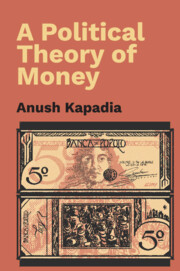12 - Democratic Sovereignty Makes Money
Published online by Cambridge University Press: 14 September 2023
Summary
Democratic sovereignty embeds national money securely in a national economy over a long time horizon. Yet, ironically, it also severely limits the tools of monetary management. Democracy's post-war rise destroyed the central bank's ability to sharply raise interest rates to stem a credit bubble as this would crash the economy (Polanyi, 2001 [1944]; Eichengreen, 1998). Without this commitment to crash the economy, global money markets became so destabilising that they had to be contained; post-war controls on global capital flows were the flipside of democracy (Ruggie, 1982).
The deregulation of the neoliberal era signalled a reversal, but democracy endured albeit weakened. ‘Privatised Keynesianism’ and a welfarist ‘politics of the governed’ in the Global North and the Global South, respectively, were required to keep a tentative social peace (Chatterjee, 2004; Crouch, 2011). Democracy still limited price-based control, but now deregulation dismantled non-price control, resulting in a substantial amplification of the inherent instability of credit. Money's inherent hierarchy was weaponised and therefore delegitimated. Instability and inequality eventually shattered the neoliberal peace, giving rise to our populist present.
Democracy therefore gives money durable scale while simultaneously limiting the set of feasible institutional arrangements. We conclude by suggesting that a democratic response to both the impairment and delegitimation of monetary governance would be to nationalise banking behind capital controls while, following Keynes, globalising ‘ideas, knowledge, science, hospitality, travel’. Democracy means nationalising banks and controlling capital flows. It does not mean narrow, exclusionary nationalism.
Collectives standing behind their money have a political choice: how do we configure a system that is inherently hybrid, hierarchical and unstable? What are our goals for this system? Do we want to maximise growth for the time being at the cost of inequality? How much instability do we tolerate in the service of this growth? How much pollution and intergenerational inequality are we willing to endure?
None of these are mechanically available, of course, but we can set the system in a direction with appropriate margins of safety. If these sound like questions for ‘fiscal policy’, it is because we are used to inhabiting a dichotomy set up by a political move to depoliticise ‘monetary policy’ as solely a technical exercise rather than an expression of politics through the design of monetary technicalities. Money is just government debt that does not mature and pays no interest. Just like government debt, it is a bet on a collective's future.
- Type
- Chapter
- Information
- A Political Theory of Money , pp. 219 - 233Publisher: Cambridge University PressPrint publication year: 2024



